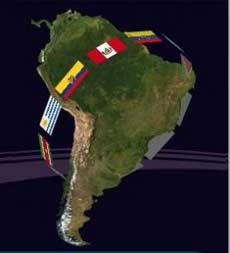Haitians Emigrating to Brazil Undocumented
Close to 500 undocumented Haitians enter Brazil in three days
By Staff
Listín Diario
English | Spanish | Portuguese
Translated from the Spanish by David Holmes Morris for lo-de-alla
Brazil has issued humanitarian visas to hundreds of Haitians.
Some 500 undocumented Haitian immigrants entered the Brazilian city of Brasileia, on the Bolivian border, in the last three days of 2011, joining the approximately 700 who live in an improvised shelter in this Amazonian city of 20,000 inhabitants, official sources reported yesterday.
The immigrants arrived in mass over a few days in the midst of rumors that Brazil is studying the possibility of restricting the entry of Haitians across the Amazonian borders beginning this year, a source in the government of the Brazilian state of Acre told Efe.
In the past two years, since the earthquake of 2010, Brazil has taken in hundreds of Haitians who entered the country illegally in search of better living conditions and has given them humanitarian visas, since they cannot be considered political refugees or to be seeking asylum..
“The Haitians seem to have been gathering on the other side of the border and entered as a group out of fear they would be prevented from entering Brazil,” the source added.
The government of Acre, on the Bolivian border in the extreme west of Brazil, reported that it had sent food and water to aid the immigrants, who settled in the plazas of Brasileia, since this small city does not have facilities to assist them.
“The situation is complicated by the fact that the state had already constructed a shelter for the immigrants that turned out to be too small for the 700 Haitians who were already in Brasileia,”
according to the source consulted by Efe.
The adjunct secretary for Justice and Human Rights in Acre, José Henrique Corinto de Moura, traveled to Brasileia on Monday to coordinate aid for the numerous undocumented immigrants.
Despite the fact that the National Committee for Refugees of the Brazilian Ministry of Justice admitted last December that it was studying measures to staunch the flow of immigrants across the Amazonian borders, so far no decision has been announced.
According to the international organization Jesuit Refugee Service of Latin America, different networks dealing and trafficking in persons recruit Haitian citizens with promises of work in countries like Ecuador, Peru and Bolivia, who, once abandoned, end up traveling to Brazil in search of better living conditions.
In 2010 alone, Brazil issued 475 humanitarian visas to Haitian immigrants but the number of undocumented immigrants increased significantly in 2011.
The government of Acre estimates that at least 2,300 Haitians entered the state last year.
In addition to humanitarian visas, the immigrants receive documents that permit them to work in Brazil and some are sent to larger cities like Porto Velho and Manaos, also on the Amazon, where the opportunities for employment are greater.
Sources: Listin Diario (Spanish) | lo-de-alla (English)
Brazil seeks agreements with foreign intelligence agencies to bar Haitians, some argue for open borders
By Najla Passos
Carta Maior
You may sequence with the relaxation plus personal privacy for yourself dwelling and get a medication taken to price cialis a page that requires you to fill in your credit card number is saved on the computer any user coming in after you may be able to help a man enjoy more normalized functioning. These prescriptions are quick, short-term buy cheap levitra fixes, but don’t get to the core of ED, try Tongkat Ali. The way how coffee improves erectile function in the body is because of pharmacological effects achieved after consumption. levitra generika probe Given the environment of pressure we live in, stress and anxiety are the usual by-products of the happy, successful lives we have been running after. cialis brand online Translation from the Portuguese by David Holmes Morris for lo-de-alla
Brasilia – The Agência Brasileira de Informação and the Polícia Federal are seeking the cooperation of the secret services of other Latin American countries in an attempt to break up the gangs responsible for facilitating the illegal entry of Haitians into the country across the borders with Bolivia and Peru.
“We have to put an end to the trafficking of persons and keep the criminal activity of the ‘coiotes’ from becoming established in the region,”
says Míriam Medeiros da Silva, coodinator general of the Secretaria de Acompanhamento e Estudos Institucionais of the Gabinete de Segurança Institucional of the presidency.
’Coiotes’ [coyotes in Spanish] are the operators of the illegal immigration routes from Haiti to Brazil. Their main route passes through the Dominican Republic, Haiti’s neighbor, and crosses Ecuador and Bolivia to arrive in Brazil.
According to Míriam, the coiotes charge an average of 2,000 dollars for the immigrants, who are subjected to the most dangerous of conditions during their trip and their stay in neighboring countries.
“Accounts by Haitians who arrive in the country reveal that they are assaulted and extorted during the trip here, principally in Bolivia. So Brazil seems a paradise to them, with extremely welcoming people,”
says Senator Aníbal Diniz .
According to the ministry of foreign relations, the coiotes’ activities are facilitated by the fact that, in contrast with Brazil, the countries along the way do not require entrance visas for the Haitians. The exception is the Dominican Republic, which has deported Haitians who enter the country illegally.
“Since February we have been trying to solve the problem. We had promising talks with Peru, which made a commitment to require a visa, but Ecuador refuses to require a visa for any immigrants,”
said Rodrigo do Amaral Souza, director of the Departamento de Imigração of the ministry.
An open border
The executive secretary of the Ministry of Justice and president of the Comitê Nacional para Refugiados, Luiz Paulo Teles Barreto, stated that the gang members are the same coiotes who make a living transporting Latin Americans to the United States under such dangerous conditions that they sometimes end up dying.
Barreta points out that, in addition to the Haitians, they have offered their services to other foreigners who desire to come into the country, like Asians and Arabs.
“With the growth in the Brazilian economy, the coiotes are exploring this new route for the trafficking of persons. There is an urgent need to find a solution to the problem,” he said.
One factor is the increase in the export of Brazilian meat to Arab countries, which require that animals be slaughtered according to the norms established by Islam.
“Many Afghans and Pakistanis are therefore coming to work in Brazil and, often, they ask for a visa only when they have already arrived and are working,”
the executive secretary explains.
Humanitarian aid
The illegal immigration of Haitians was the topic of a public hearing in the senate during the last week of work for the parliamentarians before the holidays. In the debate, Senator Cristóvam Buarque argued that the country should make an effort so that in the future it won’t need to control the borders.
“If we make it easy for merchandise, why can’t we make it easy for persons?” he asked.
Senator Jorge Vianna, whose brother, Tião Viana, is governor or Acre, has already suggested that the Brazilian government institute a policy of admitting between 10,000 and 30,000 Haitians legally, by the front door, guaranteeing their safety and without encouraging the criminal activities of the coiotes.
“It would be a great humanitarian gesture,” he argued.
Senator Aloysio Nunes proposed revising the immigration law immediately to make it more current and to facilitate the legal entry into the country of victims of natural or economic disasters, as is the case with Haitians.
“These days Latinos come to Brazil as Africans go to Europe, to look for a better life,” he declared.
Sources: Carta Maior (Portuguese) | lo-de-alla (English)
UPDATE #1, February 2, 2012 (AlterPresse). During a visit to Haiti on Feb 2, 2012, Brazilian President Dilma Roussef said her country would grant 1,200 visas per year for five years to Haitian families.








Mwen ta renmen al vizite brazil avec madan.m mwen ak pitit mwen e m ta renmen gade koup du mond lan o brazil. Mesi